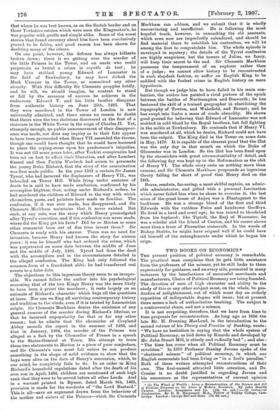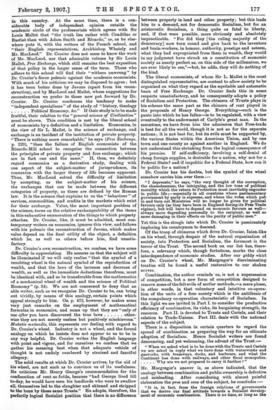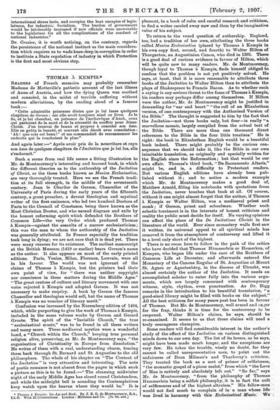TWO BOOKS ON ECONOMICS.*
THE present position of political economy is remarkable. The practical man complaius that he gets little assistance from the professors of the science, yet he still looks to them expectantly for guidance, and on every side, promoted in many instances by the benefactions of successful merchants and manufacturers, Chairs of Political Economy are being founded. The devotion of men of high character and ability to the study of this or any other subject must, on the whole, be pro- ductive of enlightenment, out of which some day an orderly exposition of indisputable dogma will issue; but at present there seems a lack of authoritative teaching. The subject is a controversial chaos, and not a science.
It is not surprising, therefore, that we have from time to time proposals for reconstruction. As long ago as 1856 the late Mr. H. Dunning MacLeod, in the introduction to the second volume of his Theory and Practice of Banking, wrote : "We have no hesitation in saying that the whole system of Political Economy, as laid down by Ricardo and developed by Mr. John Stuart Mill, is utterly and radically bad" ; and also : "The time has come when all Political Economy must be rewritten." In 1870 Professor • Stanley Jevons spoke of the "shattered science" of political economy, in which our English economists had been living as "in a fool's paradise." Both of these writers attempted reconstructions of their own. The first-named attracted little attention, and Dr. Crozier is no doubt justified in regarding Jevons and his successors as the representatives of current opinion • (1) The Wheel of Wealth being Reconstruction of the Science owl Art 4,./ Political Economy on the Lines of Modern Evolution. By John Beattie Crozier. London: , Longmatia and Co. [12e. Od. net.] —py industrial Combination. By D. H. Macgregor, M.A.. Fellow of Trinity College, Cain. bridge. London George Bell tani Sons. [7s. Sd. not.] in this country. At the same time, there is a con- siderable body of independent opinion outside the academic circle of the professoriate which agrees with Sir Louis Mallet that "the truth lies rather with Condillac or Bastiat than with Adam Smith and Ricardo," or, as he else- where puts it, with the writers of the French school, and "their English representatives, Archbishop Whately and Mr. MacLeod." Dr. Crozier does not seem to know the work of Mr. MacLeod, nor that admirable volume by Sir Louis Mallet, Free Exchange, which still remains the best exposition Of that policy in the larger sense of the term. Those who adhere to this school will find their "withers unwrung " by Dr. Crozier's fierce polemic against the academic economists. With much of his criticism we may be disposed to agree ; but it has been better done by Jevons (apart from his recon- struction), and by MacLeod and Mallet, whose suggestions for reconstruction we prefer to those now put forward by Dr. Crozier. Dr. Crozier condemns the tendency to make "independent specialisms " of the study of "history, theology Political Economy, &c." If their study is to be made fruitful, their relation to the "general science of Civilisation" must be shown. This condition is met by the liberal school of economists by a definition and a limitation. Economics, in the view of Sir L. Mallet, is the science of exchange, and exchange is an incident of the institution of private property. "There is nothing more remarkable," he says (Free Exchange, p. 229), "than the failure of English economists of the Ricardo-Mill school to recognise the connection between the principles of private property and free exchange ; which are in fact one and the same." If, then, we definitely regard economics as a derivative study, dealing with one aspect of the subject-matter of jurisprudence, its connexion with the larger theory of life becomes apparent. Thus, Mr. MacLeod solved the difficulty of limitation by accepting, as the subject-matter of his science, the exchanges that can be made between the different categories of property, as these are defined by the Roman law. It is the science that explains to us the " behaviour " of services, commodities, and credits in the markets which exist for their exchange. Value, the most important problem of the science, turns on the relative exchangeability of the items in this exhaustive enumeration of the things to which property attaches. Dr. Crozier, like, it must be admitted, most con- temporary writers on economics, ignores this view, and follows with his polemic the reconstruction of Jevons, which makes value depend on the final utility of the object, a definition which he, as well as others before him, find unsatis- factory.
Dr. Crozier's own reconstruction, we confess, we have some difficulty in appreciating. He assures us that the subject will be illuminated if we will only realise "that the symbol of a revolving wheel is the natural symbol of the reproduction of wealth, and that the laws of the increase and decrease of wealth, as well as the immediate deductions therefrom, must be identical with, and so be transferable from the mathematics of a mechanical wheel of wealth and the science of Political Economy" (p. 34). We are not concerned to deny that an able writer, such as we recognise Dr. Crozier to be, can bring out vividly, by means of this analogy, certain points which appeal strongly to him. On p. 472, however, he makes some very just remarks on the employment of mathematical formulas in economics, and sums up that they are "only of
use after you have discovered the true laws other- wise they are not merely useless but positively mischievous." Mutatis mutandis, this represents our feeling with regard to Dr. Crozier's wheel. Industry is not a wheel, and the forced analogy on which he insists does not appear to us to be in any way helpful, Dr. Crozier writes the English language with point and vigour, and for ourselves we confess that we gather his meaning best when that adequate vehicle of thought is not unduly cumbered by strained and fanciful allegory.
The solid results at which Dr. Crozier arrives, by the aid of his wheel, are not such as to convince us of its usefulness. He criticises Mr. Henry George's recommendation for the confiscation of rent as futile, because "had George lived till to-day, he would have seen his landlords who were to swallow all, themselves led to the slaughter and skinned and stripped to the bone by these same Trusts." He adopts, therefore, the Perfectly logical Socialist position that there is no difference between property in land and other property; but this leads him to a demand, not for democratic Socialism, but for an aristocratic Socialism, a thing quite as fatal to liberty, and, if that were possible, more obviously and absolutely impracticable. "For did they [ the ruling majority of the democracy] now turn round and give back to the inventors and brain-workers, in honour, authority, prestige and esteem, what they had expropriated from them in wealth, they would in my judgment have struck on a constitution of economics society as nearly perfect as, on this side of the millennium, we are ever likely to see,"—but, he adds, they will do nothing of the kind.
The liberal economists, of whom Sir L. Mallet is the most distinguished representative, are content to allow society to be organised on what they regard as the equitable and antomatio basis of Free Exchange. Dr. Crozier finds this in some respects unsatisfactory, and be consequently adopts a policy of Socialism and Protection. The chimera of Trusts plays in his scheme the same part as the chimera of rent played in the proposals of Henry George. Everything—such is the panic into which he has fallen—is to be regulated, with a view eventually to the endowment of Carlyle's great man. In the meantime, we have from him the admission that Free-trade is best for all the world, though it is not so for the separate nations ; it is not best for, but its evils must be supported by, the various States within the American Union, and by one town and one county as against another in England. We do not understand this shrinking from the logical consequence of his premiss. If self-sufficiency, involving a self-denial of cheap foreign supplies, is desirable for a nation, why not for a Federal State? and if impolitic for a Federal State, how can it be politic for a nation?
Dr. Crozier has his doubts, but the symbol of the wheel somehow carries him over them :— "I deprecate," he says, "the very thought of the corruption, the shamelessness, the intriguing, and the low tone of political morality which the return to Protection must inevitably engender in public life r—especially in all countries where parliamentary government by party is supreme, and where the votes which put in and tarn out Ministries will no longer be given for political favours only (es they have been in England during its Free Trade regime), but will have to depend on economic favours as well— always more degrading personally to the recipient, as well as more damaging in their effects on the purity of public men."
Yet this is the slough into which Dr. Crozier is passionately imploring his countrymen to descend.
Of the troop of chimeras which drive Dr. Crozier, Izion-like on his wheel, through despair of the natural organisation of society, into Protection and Socialism, the foremost is the terror of the Trust. The second book on our list has, there- fore, a relevancy which, though fortuitous, marks the close interdependence of economic studies. After our giddy whirl on Dr. Crozier's wheel, Mr. Macgregor's discriminating treatise will be found a useful restorative to our shaken nerves.
Combination, the author reminds us, is not a supersession of competition, but a new form of competition designed to remove some of the felt evils of earlier methods,—a mere phase, in other words, in that voluntary and intuitive co-opera- tion of the units of a free society which is the antithesis of the compulsory co-operation characteristic of Socialism. In this light we are invited in Part I. to consider the productive efficiency of combination, its risks, its bargaining strength, its resource. Part II. is devoted to Trusts and Cartels, and their relation to Trade-Unions. Part LTI. deals with the national aspects of the subject.
There is a disposition in certain quarters to regard the spread of combination as preparing the way for an ultimate adoption of Socialism. Hence Socialist writers are found denouncing, and yet welcoming, the advent of the Trust:—
"When we asked what is to be done with the Trusts and Cartels we are asked in reply what we have done with waterworks and gasworks, with tramways, docks, and harbours, and what the Continent has done with railways, and other fiscal monopolies.
Why are we not prepared to carry it further P"
Mr. Macgregor's answer is, as above indicated, that the analogy between combination and publics ownership is defective and misleading. After considering with almost painful elaboration the pros and cons of the subject, he concludes :— "It is, in fact, from the foreign relations of governments that we derive our final attitude towards a Socialist develop- ment of economic combination. There is no time, so long as the
international stress lasts, and occupies the best energies of legis- latures, for industrial Socialism. The burden of government would be intolerably increased if new officials were answerable to the legislature for all the complications of the conduct of national industries."
Dr. Crozier, it is worth noticing, on the contrary, regards the persistence of the national instinct as the main considera- tion which requires us to wade knee-deep in corruption in order to institute a State regulation of industry in which Protection is the first and meet obvious step.








































 Previous page
Previous page